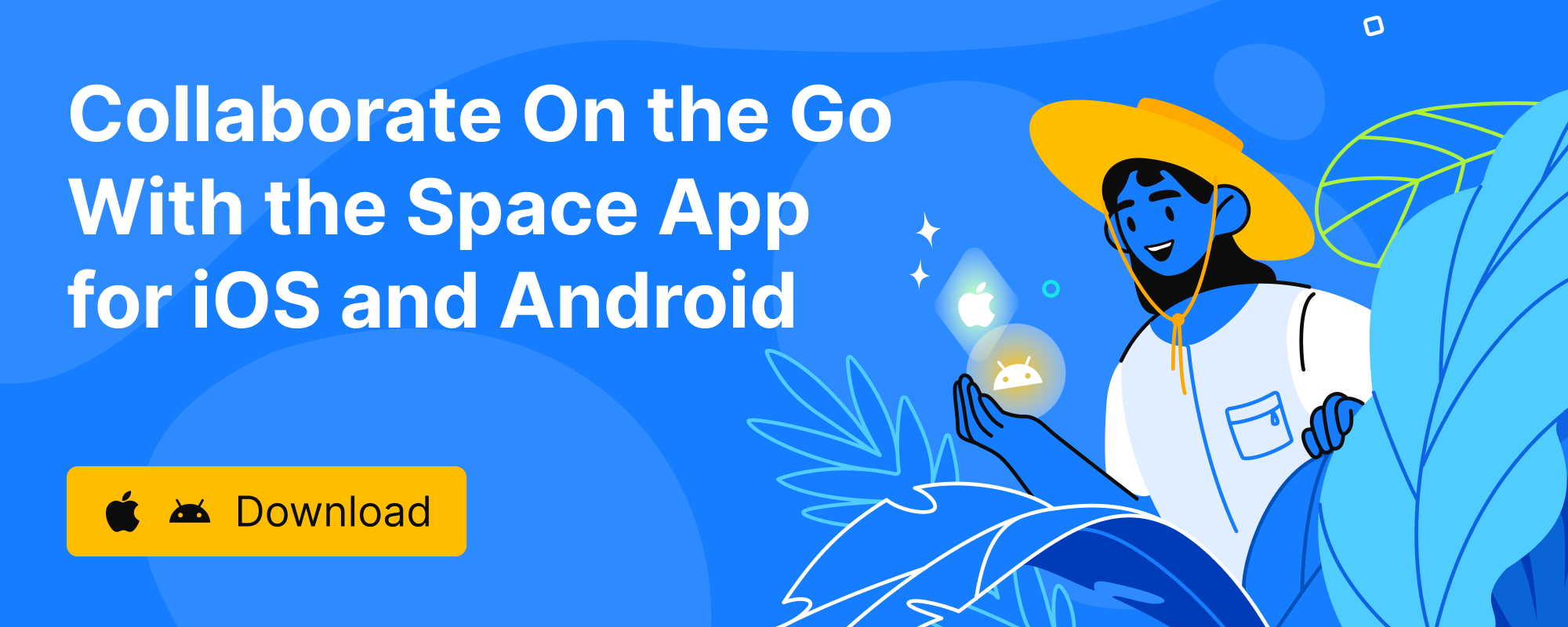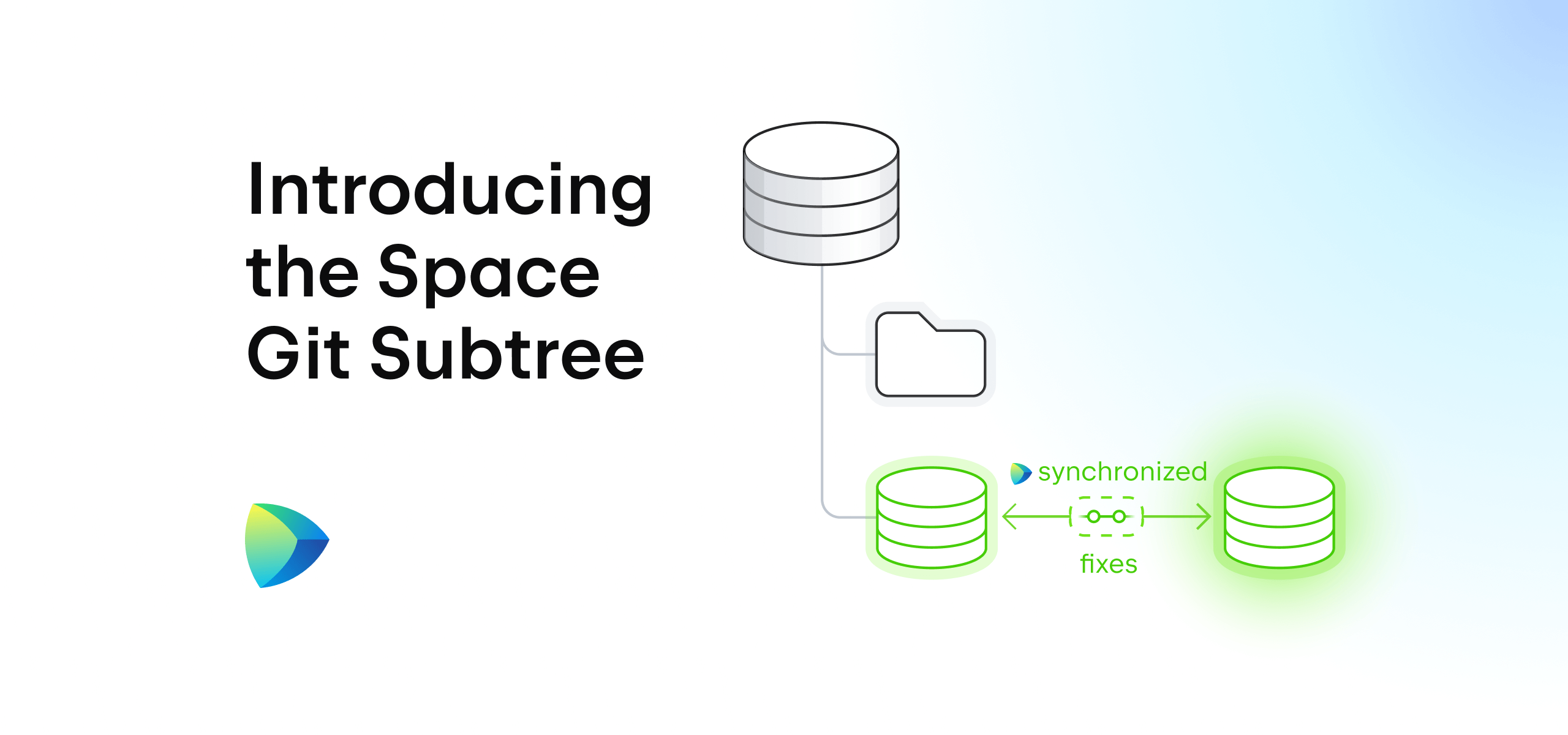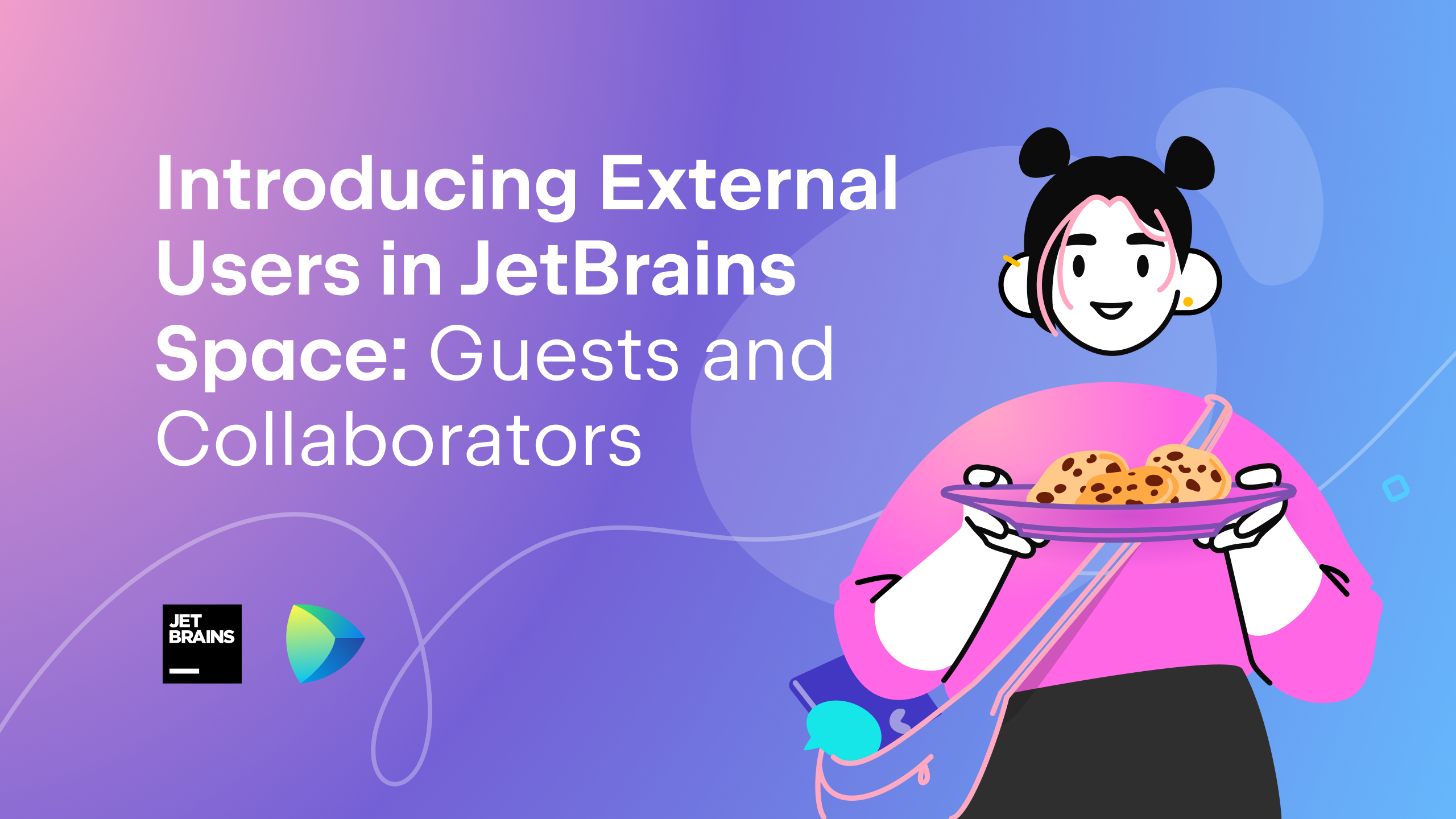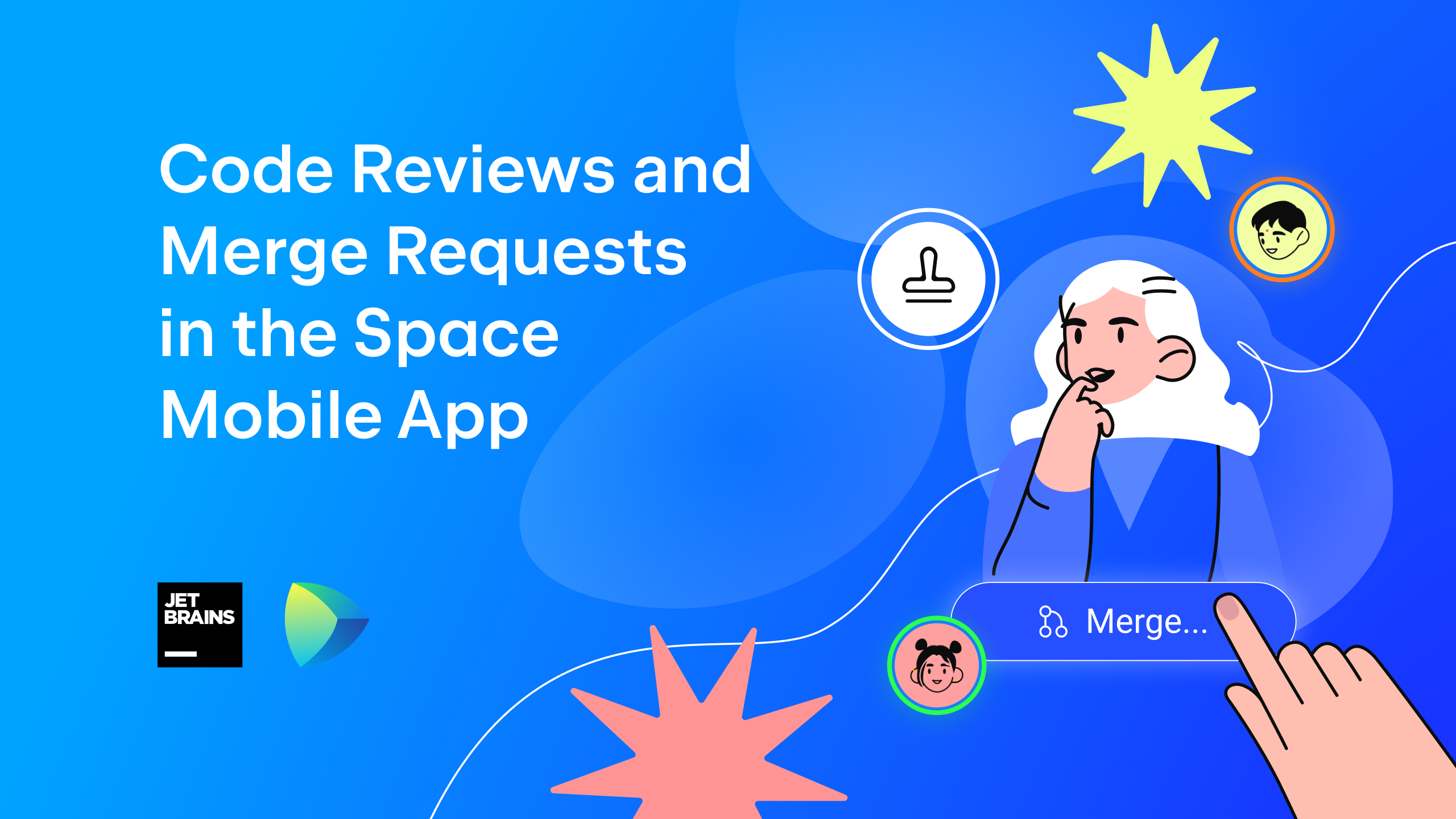Ask Me Anything Session with the Space Team: Answering Your Questions
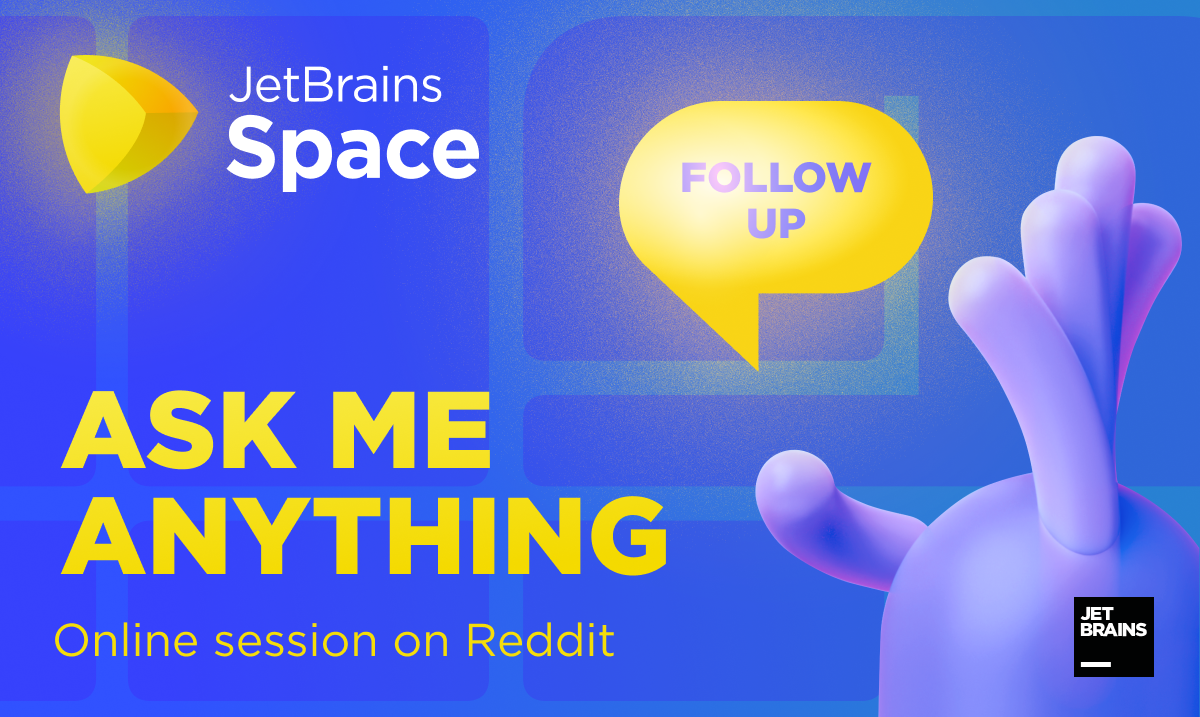
Hi everyone, the Space Team recently held our first Ask Me Anything session, and we’d like to sincerely thank everyone who took part in it! We received about 50 questions, and we are no longer answering new questions under the related post on Reddit. You can, however, always reach out to us on Twitter and our issue tracker.
Below we’ve collected the most interesting and frequently asked questions from this AMA session. Since the most questions people asked were about our plans, this post will help you to discover some Space features we’re working on or plan to embed. The full list of questions and comments can be found here.
We’ve split the questions we collected into two categories:
- Space-specific questions: general, features, billing, and plans;
- General questions about JetBrains.
Space-specific topics
Q: Can you please replace “Log in to” with an email + password login?
Maxim Mazin: Yeah, we are planning to make it possible to log in with your email at jetbrains.space and get a list of the organizations you have access to.
Q: Hi Space Team! I see Space as a very promising tool for improving internal collaboration within a company. However, software shops have been engaging the greater software community into open sourcing components, accepting contributions, and publicly tracking issues. Are there any plans to make Space a tool that helps with this increasingly common internal/external hybrid approach to software development?
Serjic Shkredov: We believe that this sort of hybrid approach is very common, and we see that poor tooling makes things significantly harder for people who try to extract components from their projects to open source. We do have plans to approach this problem in our git hosting, automation, and code review subsystems. On the other hand, we will not directly support guest access for code bases. Instead we will try to provide seamless integration with GitHub. As for a public issue tracker in Space, we will rely on integrations with other tools to address these use cases.
Q: Hi Space folks, I am a freelance app developer and I was wondering if Space is the kind of product that could become a “hub” of sorts for all my client projects, as well as for communication, source control, CI/CD (e.g. native iOS, Android, Kotlin Native) etc. I am obviously a team of 1 + my clients (and sometimes other developers I work with on a project). In any case, it was really cool to see the keynote… it’s amazing what you’ve achieved in the past months (years?).
Valerie Andrianova: Thanks a lot for your kind words, we appreciate them! Sure, you can definitely start using Space for your own projects with the free plan. You’re also welcome to invite your friends and clients to join your Space organization. However, please note that Space is a closed-system, meaning that all users need to be authorized to access Space, and there currently is no way to publicly share information in Space. Otherwise, there are no other limitations when it comes to using Space for your personal projects. Welcome to Space!
Q: Hello JetBrains! I have only one question: when will the web version of Space get a normal dark mode?
Anton Sokolov: We agree, dark mode is a must-have. We are working on it, but we don’t yet have an ETA.
Q: Hi, is there a detailed blog or YouTube video to show us how the Space team uses Kotlin to build entire products. Much appreciated.
Maarten Balliauw: There is! Maxim Mazin did a presentation about some internals at KotlinConf, and the recording is available on JetBrains TV. We use Kotlin across our entire stack. The server-side is Kotlin, and all clients are, as well (web + JS frontend, IDE plugins, and the Android and iOS apps). We use Ktor, Exposed, Kotlin-react, and many other libraries. We definitely recommend checking out the video!
Q: Hello! I am very impressed with what I’ve seen so far. This sounds like a perfect replacement for something like Basecamp, and one that can do even more. My question is, what are your ideas for helping companies adopt Space? I wish I could suggest Space as an alternative by showing everything that it can do better and how it will help us achieve our goals as a company. Some sort of training programs or a showcase of how it might be superior to alternatives would be great. Otherwise it’s hard to convince a whole company to change the tool everyone will be using without good incentives. Is there any information about that already, and if not, what are the plans for it? Thank you!
Maarten Balliauw: Thank you! The vision for Space is indeed to combine and integrate many tools, out of the box. Regarding showcases, we have a series of customer stories up at JetBrains.com. These may help demonstrate how others are using Space in various industries. Some leaflets and other materials are available here. We did a webinar back in May that covered many of the features in Space at a slightly slower pace than we did in the release video yesterday. If you’re interested, the recording is available, along with a further Q&A. When it comes to training, we have several partners that can help you out. Let us know if you’re interested, and we can put you in touch with them.
Q: Hey, folks. I’m a huge fan of all your tools! I have a small question about notifications: Can I link a to-do inside Space to a specific Pull Request and automatically complete the to-do when the PR is merged?
Anton Sukhonosenko: No, this is not currently possible. If I understand your use-case correctly, it is addressed by the separate code review widget on the main page, which lists all the reviews that need your attention.
Q: And if someone marks me as a reviewer, will I be notified?
Anton Sukhonosenko: Yes, you will be notified in chats. If 15 minutes pass before you read the notification, you will also be notified by email.
Q: As someone coming from Basecamp, is there a “zen mode” where all notifications are disabled?
Anton Sukhonosenko: Yes, this is supported in chats with a single click. When you activate ‘unavailable’ mode, Space not only blocks your notifications but also makes your status clear for everybody in your team.
Q: I’d like to know if there are any plans for guest or external access to projects.
Maxim Mazin: This is a rather popular feature request in YouTrack. So we are going to add support for this in the future.
Q: Hi! Would it be possible to deploy not a multi-tenant installation of Space to something like AWS VPC while still getting it as a SaaS? I might be missing something but it looks like a trade-off between full SaaS and on-prem.
Serjic Shkredov: Good question! Indeed, this would be a great compromise for those who would like to have the benefits of both the SaaS and the on-premise solutions. But I’m not sure we can provide you with automated updates without receiving monitoring results, logs, etc. So it will most likely be possible to install Space to your AWS VPC, but you can hardly call it SaaS.
Q: Hey Space Team, this is a very nice tool you have been working on! My question for you is: Do you plan to use “Compose for Desktop” for upcoming Space client applications? This would be a huge improvement over Electron apps.
Serjic Shkredov: We don’t have specific plans for that. But we’ve started working on a prototype. It looks very promising, and we are happy with both the developer experience and the resulting application. We hope to make it available for beta testers next year.
Q: Hello! Is there a company Wiki (not only for one project)?
Pavel Boger: We’ve moved the Knowledge base to the project level, as it seems that makes it easier to arrange information in a more structured way. As for organization-wide information, we have blogs and shared documents.
Q: Is there a voice and video chat?
Pavel Boger: Not at the moment. However, we have plans to add an integration with Google Meet in the future.
Q: Is there UML or the opportunity to integrate some UML tools like StarUML?
Pavel Boger: We are not going to add UML tools into Space ourselves. But we will be adding more extensibility features to enable third-party developers to create such integrations.
Q: Can I include my private and company addresses in my profile?
Pavel Boger: Yes, you can add as many emails to your contact details as necessary.
Q: Can I add subtasks to tasks, issues, and checklists?
Pavel Boger: You can have nested items in checklists, so each task may have sub-tasks. As for the adding sub-issues, that’s one of the feature requests that we have on our roadmap. Please feel free to upvote it.
Q: Is there a skill sheet for my skills in the user profile?
Pavel Boger: Yes, you can create custom fields in user profiles for additional information like skills, hobbies, etc.:
Q: Is Space designed for single-person projects, as well? What is the story there, why would someone who works solo on a project adopt Space?
Serjic Shkredov: We didn’t have this use case in mind when we designed Space. But we also haven’t done anything to prevent users from doing it. The Free plan will most likely work fine for your personal private organization.
Q: Space looks super awesome! Can we have a public demo or access to an example project like the Space travel scenario to test things out? That would be really helpful. Wouldn’t want to start with an empty project to try things.
Serjic Shkredov: This is not possible at the moment. We’ve been discussing providing such functionality, but we haven’t found a good technical solution yet.
Q: The documentation section was shown in the recent release video, and it looks very simple. Are there any plans for improvement? So far, Confluence looks better. Does Space have a work calendar (project tasks, writing off working hours, etc.) for the employee, and if not, when do you plan to implement one? (Sort of like Jira) Your chat is very similar to telegram chat, are there any plans for integration?
Serjic Shkredov: We have lots of plans to improve documents. Please let us know what you miss most! The work calendar has not yet been implemented, but we have it in our plans. We consider our chats self-sufficient and we don’t have plans to integrate with any other messengers.
Extensibility
Q: Do you plan on having any sort of Outlook integration? I participated briefly in the EAP and tried it out with a couple team members, but there’s no way we’d be able to pry Outlook away from the majority of the people in our organization.
Mikhail Vink: Yes, we will have an Outlook integration, as well as an integration for Google Calendar and one for general calendars via CalDav. Google Calendar is the first on the list (as we have already implemented it and are now dogfooding it inside JetBrains). It should be released publicly in the beginning of 2021, and then we’ll be working on Outlook Calendar.
Q: Do you plan to create migrations from Jira and Confluence?
Mikhail Vink: We recently released an import API for issues, so it’s already possible to build a migration from Jira to Space issues. An import API for specialized documents will be available soon, and then it will be possible to import from Confluence to Space documents, as well. We are not currently building our own migrations from Jira and Confluence to Space, but we are talking to a technology partner who is interested in doing so. This means they may be coming very soon.
Q: I have been using Space on a trial account since the beta launch. I teach programming part-time, and I’ve considered using Space as a teaching platform for communication, code sharing, documentation, and such. I know it’s a niche use case, but do you have any plans to work with that part? Or perhaps I should build a plug-in for the parts to fully support a teaching platform…
Mikhail Vink: We didn’t initially design Space for this use case, but after many discussions with educational institutions (both universities and training companies), it seems that a lot of the concepts we have in Space fit nicely into the educational process.
So we’re already seeing a significant adoption of Space in the field of education, even at this early stage. For now, we are not working on education-specific features, as our primary focus is on features related to organizations and work collaboration. In the future, we definitely plan to consider making Space even more appealing for educational institutions, but there is no specific timeline for this. A lot should already be possible with what we have out of the box, and you can integrate with Space or build on top of it to get even more features for your teaching platform. If there are any obstacles in terms of extensions, let us know. We want to make Space easy to extend for any use case, including education.
Automation
Q: Currently, is there any way to generate CI scripts from CircleCI configurations? To speed up to migration?
Alexandr Sedov: There are no migration plans from other CI/CD solutions at the moment. If there is significant demand, we may add such a generation for CircleCI at some point in future.
Q: Are there any plans to support Windows and Mac VMs for building projects in the CI?
Alexandr Sedov: Yes. We are working on the external workers feature, which will make it possible to connect VMs to a Space instance. This feature supports the Linux, Windows, and Mac operating systems. We plan to support both cloud worker VMs that are managed by JetBrains and worker VMs managed by customers.
Issues and task tracking
Q: I’m in the process of migrating our team from several apps into Space, but there’s a problem that arises from our team not being only software focused, but also having multiple engineering and marketing teams that are used to organizing their work using Kanban Boards in Trello. So far it seems that boards in Space are clearly focused for software development and lack various features for using it in other ways. Are there any plans for expanding Space’s Boards to be able to act as full replacement for Trello?
Anton Spilniy: We plan to make Boards, like all of Space, useful not only for developers but also for other teams: marketing, HR, QA, etc. We are continuing to extend the functionality of Boards. What features are you missing most?
Q: Do you have plans to add more functionality to Issues? Right now Issues seem fairly basic, I guess about feature parity with what GitHub has. My company is currently using Jira for tracking issues. We’re not “power users” by any means, but it’s important to us to be able to assign issues with a standard “type” (bug, enhancement, idea), “priority” (high, medium, low), and one or two other custom fields that are meaningful for our product. I have been checking back on Space on a regular basis to assess switching from our Atlassian-centred tools to Space instead. Lack of functionality in Issues is the biggest stumbling block. Is your thought that organizations who need something more than basic issue tracking should use a product such as YouTrack or Jira instead? Thanks!
Maxim Mazin: We’re actively working to enhance Issues in Space. At the moment, we’re working on custom fields and we’ll introduce priority as a default field along with the custom fields. Time tracking is also on our list for the future, as well as other enhancements, including sprint planning, a burndown chart, etc. We believe we’re on the way to meeting your requirements in the near future.
Q: How are YouTrack and Space related? Will Space replace YouTrack in the future? Can I import YouTrack projects, issues, time tracking, etc. into Space?
Valerie Andrianova: YouTrack and Space are two different products. YouTrack is an issue tracking and project management tool, with flexible customization and a powerful feature set. Space is much more expensive in terms of its functionality and the use cases it supports. It goes way beyond issue tracking and project management. We don’t have a plan to replace YouTrack with Space. YouTrack perfectly covers the issue tracking process, and will keep its status. Space is an all-in-one solution that completely supports the software development process and provides communication and information sharing tools. We’re actively extending issue tracking functionality in Space. At the moment we’re working on custom fields, while priority and time tracking are also on our list. You can import issues from YouTrack using our custom script. However, time tracking can’t be imported at the moment, as it’s not yet supported in Space. You can check this blog post for more details.
Q: Is there a way to sync Youtrack with the issues feature of Space? If not, what are the mid/long-term plans regarding YouTrack?
Maxim Mazin: At the moment there is only an import API for issues and an open-source application that takes issues from YouTrack and launches them into Space. We are going to evolve Space’s extensibility features to support importing issues from various sources. YouTrack is a single purpose tool that is available both as a Cloud and as an on-premise solution. If you just need a flexible issue tracker with agile boards and a knowledge base, YouTrack will work perfectly. And Space is available if you are looking for a tool to meet all of your team’s needs. JetBrains will continue developing both products to address their particular use cases.
Q: Is there a way to open up a part of the issues feature to the public, as this is already possible with YouTrack?
Maxim Mazin: Space organizations are isolated from the outside world. To access different areas in Space, including issues, one has to be a member of the organization. But we are seeing demand for anonymous and external guest access, so we are going to add some support for this in the future. There is already an issue in YouTrack about the matter.
Q: Hey guys! Space looks like it’s headed in the right direction, replacing multiple popular services at the same time. However, in comparison with YouTrack, it seems like it’s fairly behind on actual issue tracking. It does not have a lot of the stuff that matters a lot in complex projects, like custom fields in tasks, issue dependencies, issue hierarchy, roadmap views. Most of it does exist in YouTrack. Right now it feels like Space has a hole in it that could be filled by YouTrack. So the question is, are you planning to merge the services at some point? Or are you planning to redevelop YouTrack features for Space? If yes, then to what extent? Thanks!
Maxim Mazin: That’s true. YouTrack is a mature and flexible issue tracker. We don’t have a plan to merge YouTrack and Space. We will instead bring some YouTrack features into Space. We are now working on adding custom fields, and we have some further plans regarding issue links and planning boards.
Q: Will you implement the binding of commits to issues?
Maxim Mazin: Yes, we will. We actually need this feature badly ourselves. Here is the YouTrack issue.
Q: Will Space’s project issues have time tracking like in YouTrack?
Maxim Mazin: Time tracking is one of the most popular feature requests in our YouTrack. We are going to add it to our backlog.
Billing
Q: Very excited about the product! It was already mentioned in the kick-off stream chat that Standalone will probably arrive next year (and probably in “More than 1 month”). Can you already tell us about your plans for the pricing of the standalone version?
Mikhail Vink: Not at this point, I’m afraid, as we are still figuring out our options in terms of standalone pricing. We’ll announce the pricing as soon as it’s ready, and we’ll do our best to share it well in advance of the release. I would give a rough ETA (without making any commitments, of course) of Q1 2021 for the preliminary pricing announcement. There is a special option to subscribe for on-premises/standalone updates. Make sure to sign up so you don’t miss any news!
Q: YouTrack proposes pricing based on the team size (free for teams under 10). Why did you choose to set the plans based on features? Not having private projects/repos in the free plan seems to be a big barrier to new users.
Mikhail Vink: YouTrack and Space are quite different tools, thus the pricing is different. I don’t think we can compare them feature by feature, as features would mean different things in the different tools. For example, let’s talk about a notion of a private project or repo. In YouTrack, the designation “private” would refer to the visibility of the project/issues to the outside world (outside of your organization/closed circle).
In Space, we restrict our scope to inside your Space organization. In this case, if a private project or repo is private, this means that your colleagues can’t find/access it easily unless explicitly granted permissions, and it makes sense to have this feature in the pricing plans targeted at bigger teams and organizations. Non-private projects in Space will be visible to your colleagues, but in no way would they be visible to people outside of your organization. Someone has to be an organization member to get there. In terms of pricing differences between Space and YouTrack, there are a couple of key things we tried to incorporate into the Space pricing model with its 4 pricing tiers:
1. An entry level plan that lets you expand your usage of Space and that doesn’t limit you to a certain number of people, so you can invite as many colleagues as you want, and start collaborating with them. This resulted in the Free plan with unlimited users but limited features and resources).
2. Paid plans which are targeted at teams and organizations of different needs. This resulted in features being split based on the needs of different teams and organizations. The higher the plan is, the more advanced its features are.
Q: I’d like to know if having a fixed cost (like YouTrack) is still on the table, or if even in standalone we’ll get a monthly subscription per user.
Mikhail Vink: At this point, all the options are on the table and we have not made any decisions yet. As usual, all the options have pros and cons, so we are looking into it.
Q: Hi Space people! I am a big fan of JetBrains’ tools. I use CLion, Rider, and YouTrack almost daily. When will the standalone self-hosted version of Space be available?
Mikhail Vink: We plan to release the Standalone version sometime in 2021.
Q: Space looks really nice, the only question I have is, when do you plan to release the Standalone version and are there any limitations to the Standalone version.
Mikhail Vink: We plan to release the Standalone version sometime in 2021 We plan to keep feature parity between Space Cloud and Space Standalone except in cases when that’s not technically possible. So most of the features should make it into Space Standalone, with only some rare exceptions (we don’t have a list for now, as it’s all in development). Integration with some Cloud services exposed via Marketplace applications will be limited on Standalone, unless the vendor of these extensions provides some support for the on-premise version. There also could be some additional features in Standalone that originate from the deployment type and don’t make sense in the Cloud deployment.
Q: Do you have a ballpark estimate for the pricing for self hosted Space?
Mikhail Vink: We aren’t able to give a ballpark estimate at this point, sorry about that! We are working on various options, and we will make an announcement as soon as we’ve decided on the approach to pricing. At the moment there are still too many variables.
Q: How good is the integration with 3rd party Git hosting (GitLab)?
Mikhail Vink: Bi-directional mirroring of GitLab repositories definitely works well, as does repository migration from GitLab to Space. This is similar to what is described here, and it would work in the same way for other third-party Git hosting providers. At this point, there is no integration with GitLab for issues/pull requests/wiki.
General
Q: Hi Space! Are any teams at JetBrains using Space internally yet? If so, how has their migration (from presumably YouTrack) helped their team become more productive? Does the company have plans for all teams, even those that are publicly facing, to migrate in the future?
Maxim Mazin: All JetBrains employees use Space as a team directory, an HR automation, a meeting booking tool, a blog platform, etc. We’ve also migrated almost all of our VCS repositories, so several development teams are using Space for code review. Several teams have switched to Space chats from Slack and to Space issues from YouTrack. Since we’re using YouTrack as a public issue tracker, we cannot switch to Space completely, because it doesn’t support an external user role at the moment. We’re planning to provide an integration with the tools that directly communicate with external customers, including YouTrack. As to the complete migration of all the JetBrains teams to Space, we have plans for this, but we want to make the transition as smooth as possible without pushing our colleagues.
Q: Are you going to introduce something for team/personal effectiveness and health measurements? Since you basically have all the work-related data, there would be many options, such as personal advice regarding effectiveness (like too many meetings, etc.), personal surveys about engagement, measuring code churn, etc., but without going too far. The question is where is the balance, but this definitely sounds like a future of the workforce.
Mikhail Vink: That is a very interesting direction, and I agree that it is very easy to go too far here. We need to find a balance if we decide to approach it. I personally believe that there are a lot of things which can be done here without crossing the line (including personal recommendations about the duration and quantity of meetings, among other things). In that way, we would focus it around sharing “safe” information with the users themselves, rather than providing data like that to the manager or HR. So yeah, we need to look into it, but very slowly and while assessing all the risks. This is a very sensitive topic. Apart from the major ethical concerns, we need to be sure about all the local rules and regulations, too.
Q: I just want to know when Atlassian is going out of business.
Ilya Ryzhenkov: Space is a powerful tool, indeed, but it doesn’t have the power to predict the lifecycle or success of a competitor (not yet, anyway). Atlassian is a strong company and competition is a good thing, so we wish them well.
Q: This might be a bit of a silly question compared to the other ones, but here goes: What’s the full story about why JetBrains is called JetBrains, and why do all the products have such uncommon productFunction + randomWord names?
Ilya Ryzhenkov: The name JetBrains stems from word play on the phrase “thinking fast”. Then there’s the name of one of our first and most important products, IntelliJ IDEA, which is relatively easy to decode. It’s an Intelligent Java IDE(a).
Generally our product names reflect this two-part structure established with names of the company and the first product. One word suggests the technology covered by the product, and another word carries an emotional meaning (e.g. “charm”, “storm”, etc.). Over time, following this rule started to get tough, and we deviated from the pattern with CLion and AppCode. We just gave up altogether with Rider. Kotlin, our programming language, is named after an island near St. Petersburg. JetBrains Space is probably the most generic name of our products and this was intentional, as it is a space for all teams and team members to work together.
Q: Do the Space developers refer to themselves as “astronauts”?
Maxim Mazin: The Space team is multicultural. So we say astronauts or cosmonauts depending on our background.
Also, we’d like to thank the Space AMA Team, who answered the questions:
- Serjic Shkredov (Space Team Lead),
- Valerie Andrianova (Space Product Marketing Manager),
- Mikhail Vink (Space Business Development),
- Ilya Ryzhenkov (Space Product Manager),
- Alexandr Sedov (Space Software Developer),
- Anton Sokolov (Space Design Lead),
- Maarten Balliauw (Space Developer Advocate),
- Alexey Totin (Space Technical Writer),
- Max Mazin (Space Project Manager),
- Pavel Boger (Space Support Engineer),
- Alexandra Charikova (Space Marketing Projects Coordinator),
- Anton Spilniy (Space Software Developer),
- Eugene Pasynkov (Space Software Developer),
- Dmitry Loktev (Space iOS Software Developer), and
- Anton Sukhonosenko (Space Software Developer).
The Space Team
Subscribe to Space Blog updates


